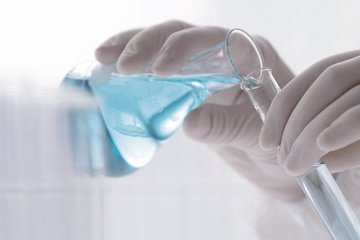
The periodic maintenance of biogas, cooling or solar thermal power systems is part of the standard process for ensuring system efficiency and operational safety, including periodic inspections of the heat transfer fluid. Once the fluid has become unstable, frost and corrosion protection can no longer be guaranteed. In particular too little antifreeze can have devastating effects on a plant.
Thermal decomposition is an antifreeze killer
The antifreeze in heat transfer fluids such as solar fluids, or radiator antifreeze, must ensure frost resistance even at low temperatures while remaining stable at high temperatures. The problem: Over time, so called thermal clusters will decompose the glycol in cooling media, which successively lose their antifreeze effect.
Not every antifreeze measurement brings valid results
A regular check of the antifreeze is also indispensable for the operational safety of the plants. Normally, all plant operators could use a refractometer to check the antifreeze themselves. But there are two problems: On the one hand, the thermal decomposition of glycol makes reliable measurements difficult per se. On the other hand, heat transfer fluids such as cooling brines, solar fluids or radiator antifreeze not only consist of pure glycol- or ethanol-water mixes but usually contain corrosion inhibitors or other additives. And there’s the rub. Traditional checks of the freezing point by measuring the density (using hydrometers) or by way of other physical-technical processes (refractometry) provide no exact results for common heat transfer fluids because their inhibitors very often significantly falsify the measurements. An exact measurement compliant with the ASTM D 1177 standard, however, will deliver genuine safety for the system.
Professional antifreeze measurement compliant with the ASTM D 1177 standard
aqua-concept GmbH now offers you professional antifreeze measurement down to –70°C compliant with the ASTM D 1177 standard. The freezing point is tested using an automatic low-temperature PLC cryostat. It mostly measures water mixes with ethylene glycol, monopropylene glycol or ethanol as antifreeze. Single and standard-compliant double determinations are possible. We provide you with a detailed analysis report and valid results to assess your system’s frost protection level.
Order our qualified laboratory service now simply and conveniently.



